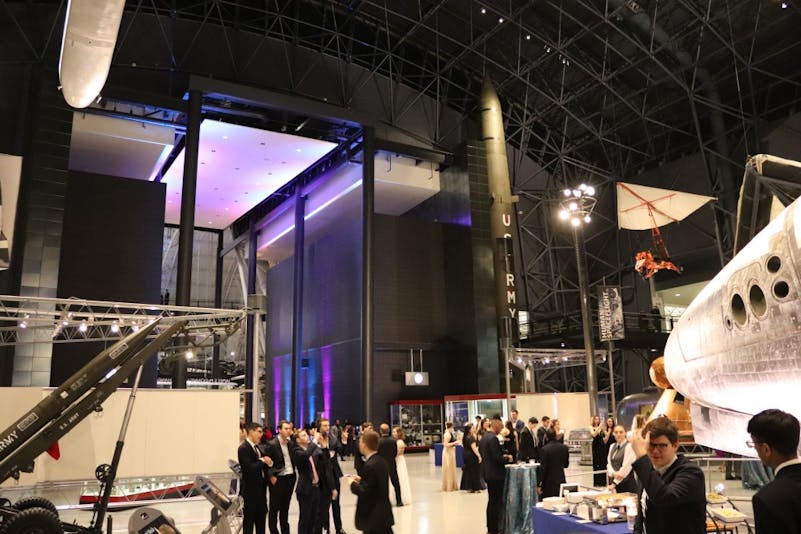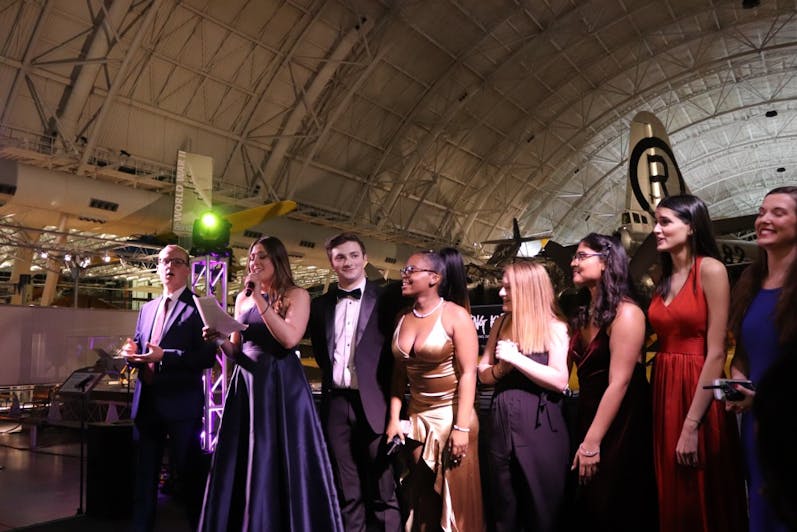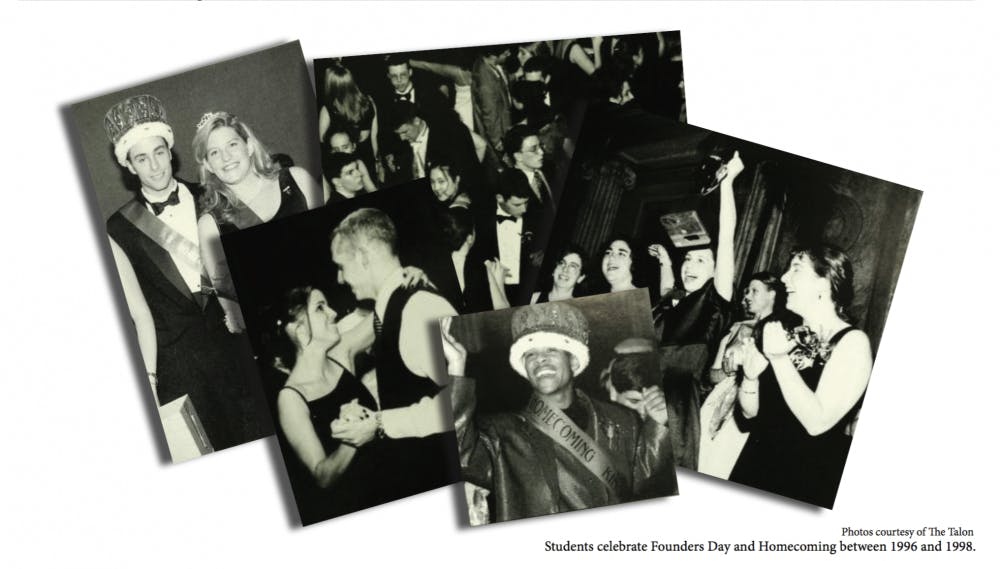$50,000 from Student Government. $20,000 from the Residence Hall Association. $2,500 from the Office of Campus Life. Along with later contributions from outside organizations, including Student Media Board, the total came to approximately $90,000.
What do you get with that money? The 2012 Founders Day Ball.
The cost has grown since then, coming in at approximately $141,000 for the 2019 ball at the National Air and Space Museum Steven F. Udvar-Hazy Center. The Founders Week team and SG said that the budgeting process, too, has changed to handle the ball’s growth. Funds are now taken “off the top” of the Student Activities budget at the beginning of the budget process.
This new process is meant to alleviate historical tensions between SG and the Founders team on one side, and the Residence Hall Association and other student organizations on the other. In the past, RHA felt they were “taken advantage of” and “viewed as more of a bank than a partner,” according to RHA documents obtained by The Eagle and an interview with Sam Rogers, a former RHA president.
The Founders team, SG and senior university administrators said that the event’s role as an important AU tradition necessitated higher spending, as it serves as a rare way to build school spirit. This status makes the Founders Day Ball, which celebrates the University’s anniversary each year, a high priority of the student activity fee revenue allocation and ensures its full funding.
“[Student Government’s Founders allocation] was never enough to fund the whole event,” said Bobby Zitzmann, chair of the Senate Finance Committee. “So what would happen is that afterward, Student Government would have to get more of its own money, and then also go to the Student Media Board and Club Council.”
Zitzmann said that in spring 2018, the student-run Budget Advisory Committee, which chooses how money is allocated between SG, the Student Media Board (of which The Eagle is a member organization) and the AU Club Council, decided on a new process for determining the Founders budget. Before distributing the $950,000 budget, the committee decided to allocate $130,000 to Founders Week instead of expecting Student Government to draw from its own budget and the budgets of other organizations.
This “off the top” method was an attempt to avoid the issues that plagued the Founders budgeting process in recent years, which previously resulted in members of RHA and other organizations feeling exploited. RHA and SG also agreed to dedicate a new liaison from RHA within the Founders team. Along with this budget, RHA donated $9,750 to this year’s ball, as their funds are not derived from the student activity fee and are therefore not affected by the new “off the top” process.
“This year, Founders Board has been very transparent and very clear with us about what they want,” said Jared Bedell, the current RHA president. “Delegates this year felt much more comfortable with giving the funds, and there wasn’t as much of a debate, because of the constant communication [with the] liaison position.”
“Viewed as more of a bank than a partner”
In RHA documents obtained by The Eagle, Yazmin Padilla, the outgoing 2016-2017 RHA vice president of programming, warned her successor about the pressures often exerted by SG.
“When SG comes to you they will present the need for RHA to financially contribute as absolutely imperative in order for Founders to happen,” she wrote. “DON’T FALL FOR IT! One way or another Founders will happen.”
Rogers, a senior who served as RHA president from 2016 to 2018, concurred. He said that in his first term as president, the Founders team reached out over the summer to coordinate with RHA. The process, at first, went smoothly but it devolved over time until Rogers felt that RHA was not being included in the decision-making process, and began to question the amount of money they were spending on the event.
“I think the biggest problem is that the RHA contribution to Founders Day is always taken for granted…[they said] if you don't give money, Founders Day might not be able to happen at all,” Rogers said.
RHA contributions are rarely insignificant. In 2018, RHA contributed $9,240. In 2017, it was $20,000. In 2016, $15,000. And in 2015, 2014, possibly 2013, and 2012, RHA gave $20,000 each year. For 2012, RHA spent more on Founders than on all of their own programming for that year.
In 2012, SG allocated $50,000 for the event, expecting RHA to handle an additional 40 percent of the cost of the event.
“During one meeting, we were told by Founders staff that if we didn't give them money, they would just get it somewhere else,” Rogers said of the negotiations for the 2018 ball. “They were saying that they needed us on one hand, but on the other, they didn't really care about us or our partnership.”
As Zitzmann and other SG members point out, the amount that SG allocated for the event every year was never enough. The Founders team would regularly need to approach RHA and SMB for additional funds or would pull money out of the SG restricted fund, which is intended to be used as an emergency reserve.

The 2019 ball was held at the National Air and Space Museum Steven F. Udvar-Hazy Center in Virginia. SOPHIE LAMPL/THE EAGLE
SG records only reflect the budget allocated for the ball by SG and are therefore partially incomplete, Zitzmann said, leading to a massive underreporting of costs.
Ayana Wilson, the director of Student Activities, said the full spending records are difficult to obtain because they aren’t stored online and involve direct transactions between SG and confidential vendors, along with organizations such as SMB.
This lack of recordkeeping implies a level of spending increase that isn’t entirely accurate, but there has been a significant spike in spending over time. For example, in 2009, the SG allocation for the event was $28,500. This was when SG still charged for tickets, although records do not indicate how much they cost.
How Founders Day became a central AU tradition
Michael Elmore, the director of University Center and the former longtime director of Student Activities, said the conception of Founders Day Ball as a tradition began with the 2008 ball, which combined a formerly small, exclusive and student-run night of festivities — typically at a local ballroom — with the inauguration party of previous University President Neil Kerwin. It also incorporated the previously soccer-oriented fall homecoming celebration, Elmore said.
“The question to ask would be, ‘How much of a tradition is this?’ and ‘to what degree is it [a tradition]?” Elmore said. “‘Should it be a tradition? Or should it be something else?’”
University funding of the inauguration empowered organizers to expand the scope and venue, ultimately deciding on the more expensive Union Station over previous, smaller locations. However, in recent years, AU stopped providing funds to the ball, leaving SG to foot the bill for larger and expanded student expectations.
Because of this growth, the event became a more of a tradition at AU, said Fanta Aw, the University’s vice president of campus life and inclusive excellence. Back in 2008, when the event was just gaining popularity, tickets cost anywhere between $10 to $20.
This continued until 2012, when Founders moved from being a ticketed event to being a free event because concerns about accessibility for lower-income students were raised. Additionally, the conversation shifted into trying to making more room for students to attend.
Regarding the ever-increasing size of Founders, Rogers didn’t believe student demands were the sole reason for the budgeting changes. Whether it’s a new university president’s inauguration or another university landmark, he said, “every year, it's a different excuse.”
Emma Galasso, the Founders Week director for 2019, said that one of her main criteria for selecting a location for Founders was the size of the venue.
“It mainly is, you know, how many students can we get into the space and the 2,500 number [of students] is our biggest number yet,” she said.
The future of the ball
The meaning of Founders Day Ball and its growing budget have been challenged by several students in recent years, including a controversy surrounding founder John Fletcher Hurst’s historical ties to slavery. Hurst’s ownership of at least one slave was publicized by Nickolaus Mack, The Eagle’s opinion editor, in spring 2018, leading to the creation of a university group to research AU’s historical ties to slavery.
A failed referendum to raise the student activity fee in October also allowed many students to air their concerns about how SG spends student money, including Founders Day. At a Senate meeting in January, sophomore Joyce DeCerce likened the failed referendum to an SG approval rating.
“74 percent of students don’t trust AUSG,” DeCerce said. “How do we know that? Because 74 percent of students voted against giving AUSG more money…in the fall referendum.”
In the wake of the criticism, top SG representatives have called for an evaluation of the organization’s budget.
“I don’t think tradition is something we should spend this money for,” SG President Valentina Fernandéz said at her “State of Student Government” speech in January, referring to Founders Week.
She questioned general SG budget allocations and said that it might be important to re-examine financial priorities in a later interview with The Eagle.
Despite the continued growth of Founders spending, SG members are not without reservations. Multiple representatives, including Galasso and Fernandéz, along with administration officials like Aw and Wilson, have said they encourage a re-evaluation of Founders expenses.

Members of Student Government who helped plan the 2019 ball, including director Emma Galasso, speak during the event. SOPHIE LAMPL/THE EAGLE
“There needs to be a cost-benefit analysis,” Aw said. “Students are at different stages of what they think is most valuable at different time periods. I think, you know, that's a question and that's a discussion that I think needs to be had among students, including the Student Senate, AUSG, and all the key stakeholders.”
Galasso said this discussion is something she highly values, too. Her team distributed a post-Founders survey to attendees to gauge student satisfaction and to discern whether the ball should be reconfigured in future years.
“We've been talking about just long-term, you know, whether this one-night celebration is something we're going to do in years to come because of…the vocal unrest that has been expressed,” Galasso said.
Aw said that she believes AU students crave “tradition,” and that in the absence of Founders, they would look for new ways to exercise school spirit. This emphasis on the importance of tradition was echoed by many, including Galasso, Elmore and Wilson. The necessity for such a school-wide tradition was their primary cause for reticence in ending or reforming the event.
If the Founders Day Ball were to end or be drastically changed, Aw and Wilson said, there would need to be a heavy emphasis on rebuilding community engagement and school spirit in ways that Founders has done in recent years.
“[There’s a need for] a common shared experience, what would that be at American University?” Aw said. “The point is, what do students want? What really captures their imagination and gives them a sense of school spirit, you know? That would be a conversation that I would be interested in.”
Note: Kris Schneider is The Eagle’s assistant copy editor and the assistant director for Founders Week. He was not involved in the writing, reporting or editing of this article.
This article originally appeared in The Eagle's March 2019 print edition.
aweinstein@theeagleonline.com and dpapscun@theeagleonline.com





